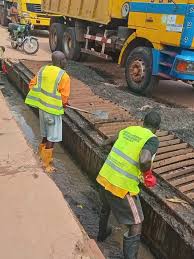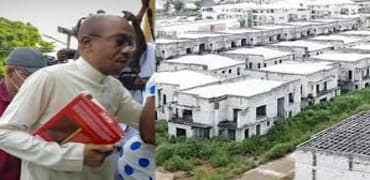Kaduna Govt Kicks Off 200,000-Metre Drainage Desilting to Combat Flooding
Kaduna Govt Kicks Off 200,000-Metre Drainage Desilting to Combat Flooding
The Kaduna State Government has launched a large-scale desilting and dredging exercise spanning 200,000 metres of drainage channels across the state, as part of efforts to prevent devastating floods during the rainy season.
The initiative, flagged off on Thursday in Sabon Tasha, Chikun Local Government Area, also includes the dredging and expansion of River Kaduna and will cover the major cities of Kaduna, Zaria, and Kafanchan.
Speaking at the event, Commissioner for Environment and Natural Resources, Mr. Abubakar Buba, represented by the ministry’s Permanent Secretary, Mrs. Linda Yakubu, said the project was supported by the Agro-Climatic Resilience in Semi-Arid Landscapes (ACReSAL) programme.
“Last year we cleared 160,000 metres of drainages. This year, we have increased the coverage to 200,000 metres to protect more communities from floods,” Buba said.
He explained that Sabon Tasha was deliberately chosen for the flag-off due to its history of flash floods, which in previous years displaced households and damaged property.
Communities Warned Against Blocking Drainages
While reaffirming government’s commitment to flood control, the commissioner stressed that the sustainability of the project also depended on residents.
“The government has provided the drainage, but citizens must keep it free from refuse to allow water flow. Dumping waste at median separators and waterways is an eyesore and a health risk that exposes residents to disease outbreaks,” he cautioned.
Officials from relevant federal agencies also weighed in.
Mrs. Ikramat Umar, Assistant Chief of the Disaster Reduction Unit at the National Emergency Management Agency (NEMA), described disaster management as a shared responsibility.
“Government has shown commitment, but residents must also play their part by keeping drainages clean and avoiding indiscriminate waste disposal,” she said.
Similarly, Mrs. Rahama Suleiman, Head of Environment, Climate, and Energy at the National Orientation Agency (NOA), commended the state government, while noting that community sensitisation was ongoing.
“We are educating people on the dangers of dumping refuse into waterways and encouraging them to take ownership of their environment,” she said.
Youth Groups Join the Effort
Civil society groups and youth organisations also pledged to support the exercise.
Michael Augustin, Coordinator of Concerned Sabon Tasha Youth, assured that local youths would collaborate with government task forces to prevent traders and residents from using road dividers and drainage channels as dumpsites.
“We will work with the government taskforce to stop traders from turning road dividers into refuse dumps. Flooding affects everyone, so we must protect our own communities,” Augustin said.
Towards a Flood-Free Kaduna
Kaduna, one of Nigeria’s flood-prone states, has in recent years witnessed flash floods that displaced residents and strained emergency response systems. With climate change and rapid urbanisation exacerbating the problem, stakeholders say the current desilting and dredging drive could significantly reduce risks—if residents support the process.
For now, excavators rumbling through Sabon Tasha signal more than a government project; they mark a race against time to ensure homes and livelihoods are safeguarded before the rains reach their peak.
By Haruna Yakubu Haruna

















